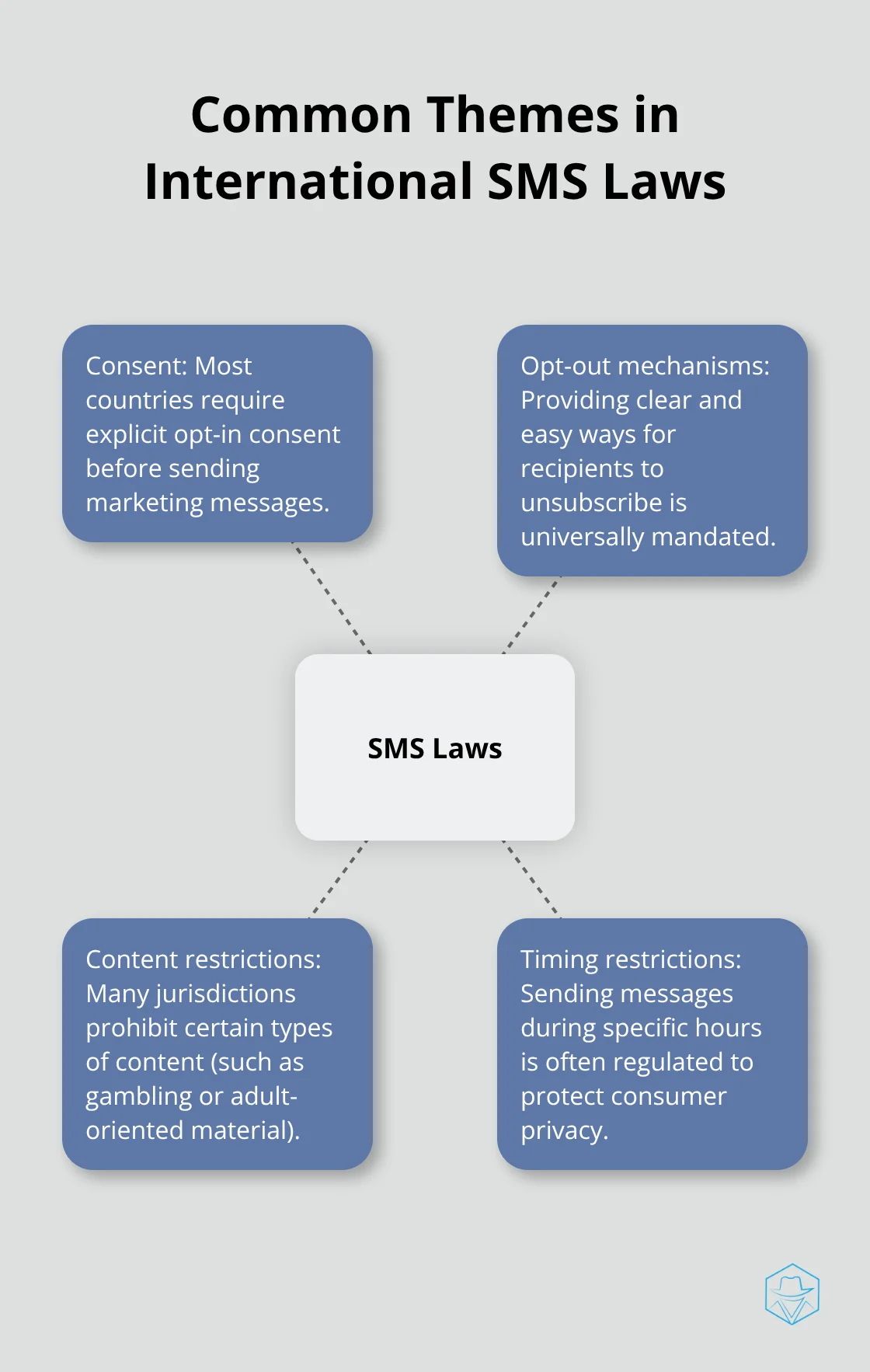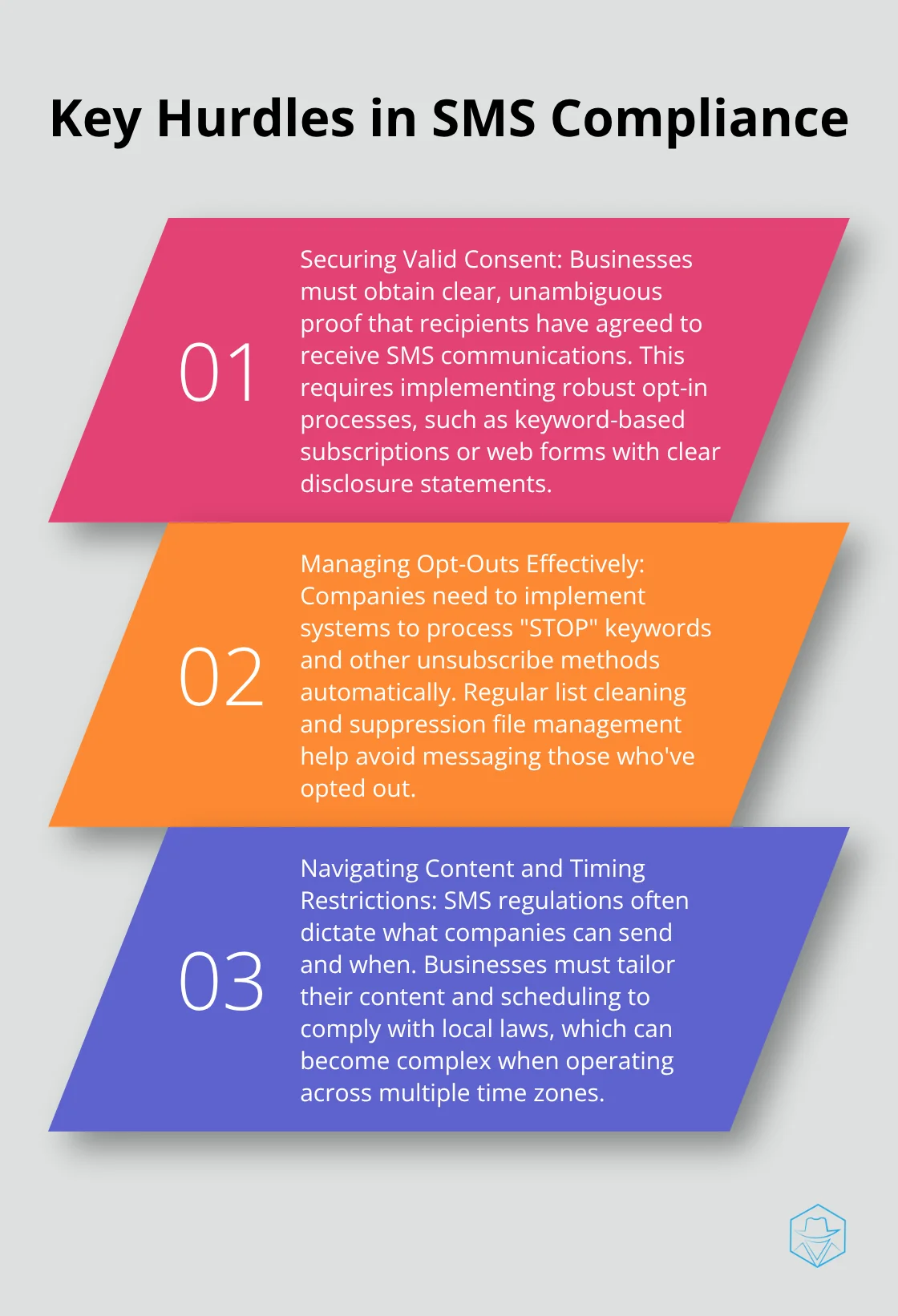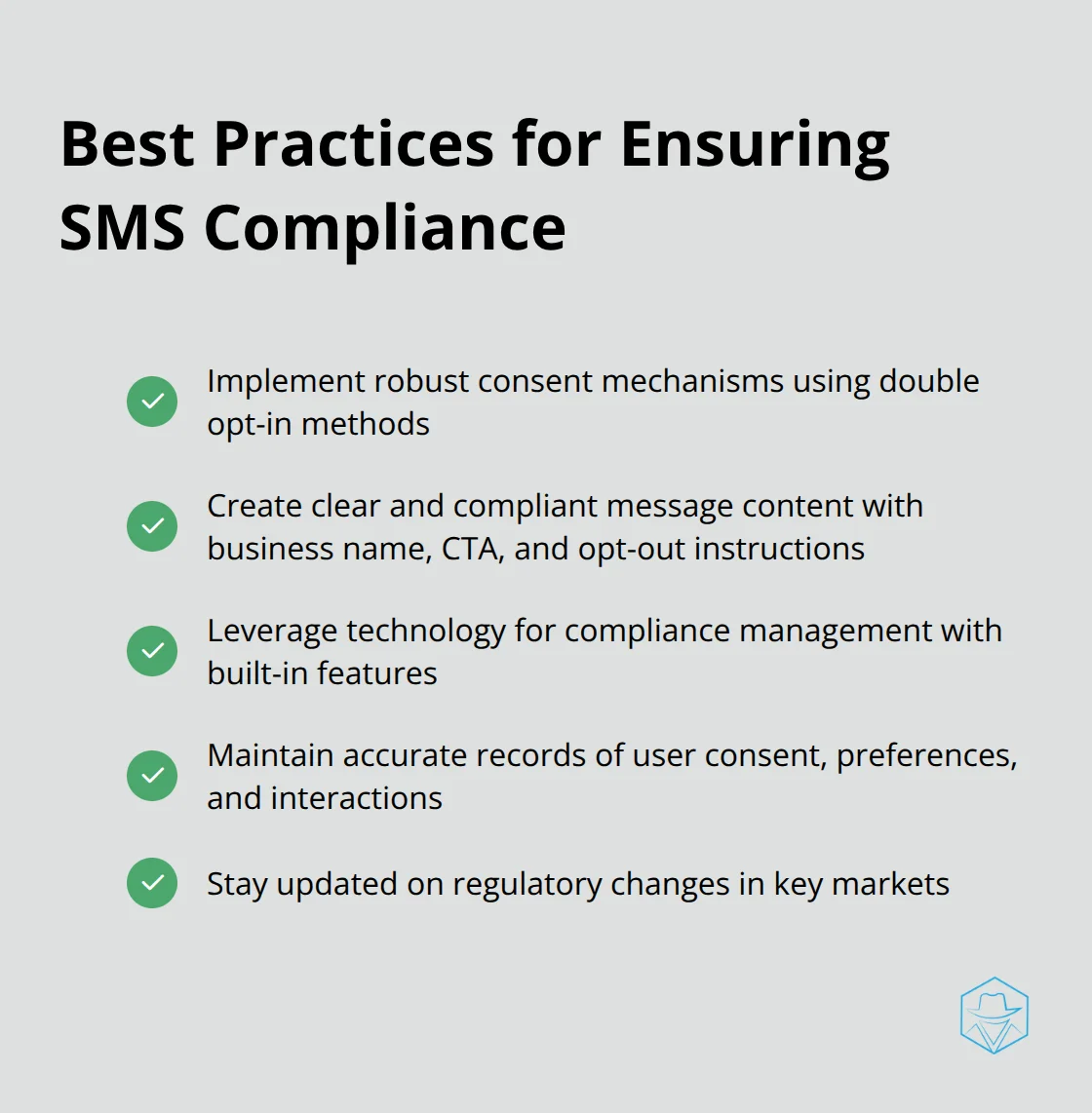Navigating International SMS Regulations A Comprehensive Guide

At Drop Cowboy, we understand the complexities of global compliance in SMS marketing. International SMS regulations can be a minefield for businesses operating across borders.
This comprehensive guide will help you navigate the intricate landscape of SMS laws worldwide. We’ll explore key challenges, best practices, and future trends to ensure your SMS campaigns remain compliant and effective.
How Do SMS Regulations Differ Globally?
SMS regulations vary significantly across the world, making it challenging for businesses to navigate international messaging campaigns. Understanding these differences is essential for maintaining compliance and avoiding costly penalties.
North America: Strict Consent and Opt-Out Rules
In the United States, the Telephone Consumer Protection Act (TCPA) governs SMS marketing. It requires explicit written consent before sending promotional messages. The Federal Communications Commission (FCC) enforces these rules, imposing fines of up to $1,500 per violation. Canada’s Anti-Spam Legislation (CASL) similarly mandates clear consent and easy opt-out mechanisms.
European Union: GDPR and ePrivacy Directive
The EU’s General Data Protection Regulation (GDPR) and ePrivacy Directive set stringent standards for data protection and electronic communications. These regulations require businesses to obtain explicit consent, provide clear opt-out options, and protect user data. Fines for non-compliance can reach up to €20 million or 4% of global annual turnover (whichever is higher).
Asia-Pacific: Diverse Landscape of Regulations
In Asia, regulations vary widely by country. China requires businesses to register SMS templates and use specific Chinese Character Signatures. India mandates sender registration using Distributed Ledger Technology. Australia’s Spam Act prohibits unsolicited commercial messages without prior consent.
Common Themes in International SMS Laws
Despite regional differences, several common themes emerge in global SMS regulations:

Navigating the Regulatory Landscape
To navigate this complex landscape, businesses should partner with experienced SMS service providers. These providers offer compliance tools and expertise to help businesses adhere to diverse regulations while maximizing the effectiveness of their SMS campaigns.
As we move forward, it’s important to examine the specific compliance challenges that businesses face when implementing SMS marketing strategies across different regions. Let’s explore these hurdles in more detail.
Overcoming SMS Compliance Hurdles
Businesses face significant challenges when they implement SMS marketing strategies across different regions. Let’s explore the key hurdles that companies must overcome to ensure compliance and maximize the effectiveness of their campaigns.

Securing Valid Consent
Obtaining proper consent forms the foundation of SMS compliance. In the US, the TCPA requires written consent for marketing messages. This means businesses must have clear, unambiguous proof that recipients have agreed to receive SMS communications. Companies need to implement robust opt-in processes, such as keyword-based subscriptions or web forms with clear disclosure statements. (Simply having a phone number isn’t enough.)
Managing Opt-Outs Effectively
A clean contact list is essential for compliance and campaign success. The FCC mandates that businesses honor opt-out requests promptly, typically within 10 business days. This requires companies to implement systems to process “STOP” keywords and other unsubscribe methods automatically. Regular list cleaning and suppression file management help avoid messaging those who’ve opted out.
Navigating Content and Timing Restrictions
SMS regulations often dictate what companies can send and when. For instance, the CTIA guidelines prohibit content related to alcohol, tobacco, and gambling in many jurisdictions. Timing restrictions vary by country – France forbids sending promotional SMS on Sundays. Businesses must tailor their content and scheduling to comply with local laws, which can become complex when operating across multiple time zones.
Ensuring Data Protection and Privacy
With regulations like GDPR in Europe and CCPA in California, data protection has become a critical aspect of SMS compliance. Companies must implement strict data handling procedures, including secure storage, limited access, and proper deletion protocols. Transparency about data usage is also vital – privacy policies should clearly explain how customer information is collected, used, and protected.
Leveraging Compliance Tools and Expertise
To navigate these compliance challenges effectively, businesses should consider partnering with experienced providers that offer built-in compliance tools and expertise. These providers can help companies navigate the complex landscape of international SMS regulations while maximizing their marketing efforts. Such partnerships can prove invaluable in staying up-to-date with evolving regulations and implementing best practices for SMS compliance.
As we move forward, let’s examine the specific best practices that businesses can adopt to ensure SMS compliance across different regions and regulatory frameworks.
How to Ensure SMS Compliance Across Borders

Implement Robust Consent Mechanisms
Create a foolproof consent process to stay compliant with international regulations. Use double opt-in methods where subscribers confirm their willingness to receive messages twice. After a user submits their phone number on your website, send a text asking them to reply “YES” to confirm subscription. This approach not only ensures compliance but also improves engagement rates by confirming genuine interest.
Create Clear and Compliant Message Content
Craft your SMS content with compliance in mind. Always include your business name, a clear call-to-action, and opt-out instructions in every message. A compliant message format might look like this: “XYZ Company: Get 20% off your next purchase! Shop now at xyz.com. Reply STOP to opt out.” This format satisfies regulations in most jurisdictions and provides transparency to your subscribers.
Leverage Technology for Compliance Management
Use advanced SMS platforms that offer built-in compliance features. These tools can automatically manage opt-outs, track consent, and ensure messages are sent within permitted hours across different time zones. Some platforms offer systems that optimize message delivery while adhering to local regulations in numerous countries.
Maintain Accurate Records
Keep detailed records of user consent, preferences, and interactions. This practice not only helps with compliance but also provides valuable insights for future campaigns. Store information about when and how users opted in, their preferences, and any changes to their subscription status. (This data can prove invaluable if you face a compliance audit.)
Stay Updated on Regulatory Changes
International SMS regulations evolve constantly. Assign a team member to monitor changes in key markets where you operate. Subscribe to regulatory updates from relevant authorities and industry associations. This proactive approach helps you adapt your SMS strategies quickly to new compliance requirements.
Final Thoughts
Global compliance in SMS marketing presents significant challenges for businesses operating across borders. SMS laws differ widely between regions, with each area imposing unique requirements for consent, opt-outs, and content restrictions. Companies must implement robust processes to obtain explicit consent, maintain accurate records, and stay informed about regulatory changes to mitigate risks and maximize campaign effectiveness.
The SMS regulatory landscape will likely continue to evolve, with an increased focus on data protection and privacy. As new technologies emerge, regulators may introduce additional rules to address future challenges in digital communication. Companies need to remain vigilant and adaptable to maintain compliance in this dynamic environment.
Drop Cowboy’s comprehensive platform offers tools designed to enhance SMS marketing while ensuring compliance across multiple jurisdictions. Our features include Smart Delivery™ for efficient global message delivery and built-in compliance tools (which can help businesses expand their reach while adhering to international regulations). Companies that prioritize compliance and leverage advanced SMS marketing solutions can harness the full potential of text messaging as a powerful communication channel.
blog-dropcowboy-com
Related posts

May 19, 2025
Choosing the Right Real Estate Wholesale Course
Find the ideal real estate wholesale course for your career. Explore top options, factors to consider, and maximize your investment in education.

May 23, 2025
How to Streamline Lending with LoanPro Software
Streamline your lending process with LoanPro Software. Discover efficient tools and strategies to enhance your lending operations today.

April 9, 2025
Examples of Successful Marketing Automation Campaigns
Explore powerful examples of marketing automation campaigns that boosted engagement and sales, showcasing real-world successes.

April 14, 2025
Email Hosting Solutions for Shopify: What You Need to Know
Explore the best email hosting Shopify options to boost communication, streamline operations, and enhance customer engagement for your online store.

August 22, 2025
Leveraging AI for Deep Message Personalization
Explore AI personalization to boost customer engagement with deep message customization. Discover practical tips and tools for effective communication.

June 2, 2025
How to Optimize Call Centers with the Right CRM
Optimize call centers efficiently using the right CRM for call center. Enhance customer experience and boost productivity with tailored solutions.